

Www.ieee.es/Galerias/fichero/docs_analisis/2013/DIEEEA49-2013_Keita_DemocraciaMali_JDA.pdf. Mali 2.0 - By Peter Tinti. BAMAKO, Mali — In late July, the people of Mali, a poor, landlocked West African nation once considered by many to be a model democracy, turned out in record numbers for presidential elections.
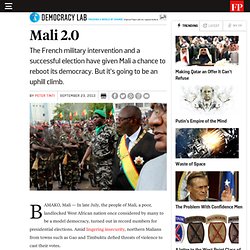
Amid lingering insecurity, northern Malians from towns such as Gao and Timbuktu defied threats of violence to cast their votes. In muddy courtyards across the lush riverside capital city of Bamako, women in colorful wax-print outfits stood next to women in all black, their faces veiled by the niqab. Mali: The new president’s top 5 priorities.
1.
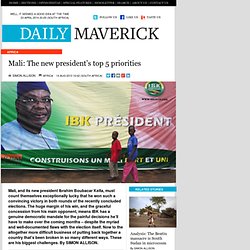
Giving the men with guns something else to do Men with guns are a dangerous combination at the best of times. In northern Mali, where many of the men with guns are part of a defeated political force and where other gainful employment is scarce, they’re even more dangerous. If he is to have any chance of stabilising the northern region, which was the source of both the nationalist and Islamist-led rebellions last year, IBK is going to have to find a way to get the fighting-fit and well-armed rebel fighters on his side.
World Elections. Presidential and legislative elections were held in Mali on July 28 and August 11 (presidential runoff) 2013.
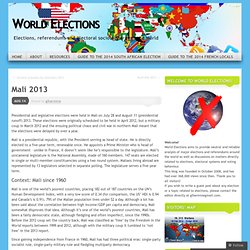
These elections were originally scheduled to be held in April 2012, but a military coup in March 2012 and the ensuing political chaos and civil war in northern Mali meant that the elections were delayed by over a year. Mali is a presidential republic, with the President serving as head of state. He is directly elected to a five-year term, renewable once. Mali 2013. Profiles of the main candidates: Dramane Dembélé (Alliance for Democracy in Mali): Relatively young, unknown candidate of the country's largest, best organized political party, the Alliance for Democracy in Mali (ADEMA).
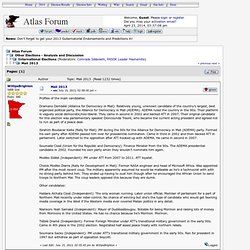
ADEMA ruled the country in the 90s. Their platform is vaguely social democratic/neo-liberal. They came in second in 2002 and backed ATT in 2007. Their original candidate for this election was parliamentary speaker Dioncounda Traoré, who became the current acting president and agreed not to run as part of a peace deal. Elections maliennes bilan et perspectives « askiamohamed. La page de l’élection présidentielle 2013 au Mali s’est refermée (en attendant les résultats définitifs) hier soir, par un acte très symbolique et de haute valeur du challenger Soumaila Cisse, qui s’est rendu au domicile du favori, et désormais Président de la République du Mali Ibrahim Boubacar Keita.
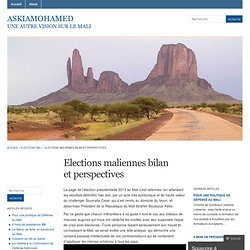
Par ce geste que chacun interprétera à sa guise il tord le cou aux oiseaux de mauvais augures qui nous ont rabâché les oreilles avec leur supposée risque de crise post-électorale. Toute personne faisant sérieusement son travail et connaissant le Mali se serait évitée une telle analyse, qui démontre une certaine paresse intellectuelle de ces commentateurs qui se contentent d’appliquer les mêmes schémas à tous les pays. L’occasion pour nous de revenir sur cette élection, qui était en soi un défi immense à relever pour l’Etat malien, et notamment les autorités de la transition. Son concurrent Cisse lui rentrait plus dans ses costumes de technocrate chevronné connaissant bien ses dossiers. IBK the Shapeshifter: A Portrait of Mali's Probable Next President. Ibrahim Boubacar Keita, first-place finisher in Mali’s 28 July first round of presidential voting, had always been expected to make a strong showing in this race, having run for president twice before.
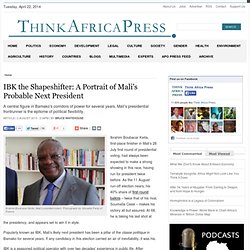
As the 11 August run-off election nears, his 40% share of first-round ballots – twice that of his rival, Soumaïla Cissé – makes his victory all but assured. At 68, he is taking his last shot at the presidency, and appears set to win it in style. Mali: The new president’s top 5 priorities. 1.
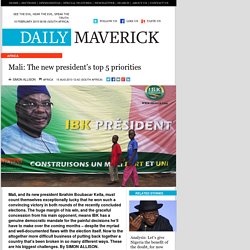
Giving the men with guns something else to do Men with guns are a dangerous combination at the best of times. In northern Mali, where many of the men with guns are part of a defeated political force and where other gainful employment is scarce, they’re even more dangerous. If he is to have any chance of stabilising the northern region, which was the source of both the nationalist and Islamist-led rebellions last year, IBK is going to have to find a way to get the fighting-fit and well-armed rebel fighters on his side. OP-ED: What next for Mali’s post-election leadership? A woman carrying her baby and wrapped with a shawl walks through a sandstorm in Timbuktu July 29, 2013.
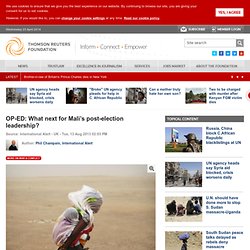
REUTERS/Joe Penney Any views expressed in this article are those of the author and not of Thomson Reuters Foundation. The second round of the presidential election in Mali was held on Sunday 11th August. Despite continued political instability, the atmosphere in the country was generally calm. The turnout amongst the 6.8 million citizens eligible to vote (out of a population of about 15.8m) was higher than expected. However, the newly elected president, Ibrahim Boubacar Keita, will not be underestimating the difficulty of meeting the expectations of citizens wanting change. Managing Mali’s elections: a short delay would pay long-term dividends. Dakar/Brussels | 26 Jun 2013 The recent agreement between the government and two rebel Tuareg groups is a positive step, but Mali’s politicians should now consider delaying presidential elections, the first round of which is currently scheduled for 28 July.
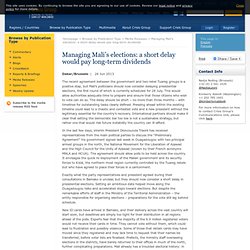
This would allow authorities adequate time to prepare and ensure that those citizens who wish to vote can do so. The delay should be short – no more than three months – with timelines for outstanding tasks clearly defined. Pressing ahead within the existing timeline could lead to a chaotic and contested vote and a new president without the legitimacy essential for the country’s recovery. International partners should make it clear that setting the democratic bar too low is not a sustainable strategy, but rather one that would risk future instability the country can ill-afford. Www.ifes.org/~/media/Files/Publications/VRC/Civic Education/2004/CE00997/CE00997.pdf. Analysis: The dangers of rushing Mali elections. Elections in Mali could pose a danger, if rushed, say observers (file photo) July elections could further destabilize north MINUSMA will barely have settled in by July Reconciliation body yet to gain momentum Elections would coincide with rains, Ramadan DAKAR/BAMAKO, 6 June 2013 (IRIN) - As international donors, notably France and the USA, as well as the Economic Community of West African States, push for July presidential elections in Mali, critics say doing so could foment factionalization in the north thus further destabilizing it, threaten ongoing negotiations over Kidal town, and hamper reconciliation and dialogue.
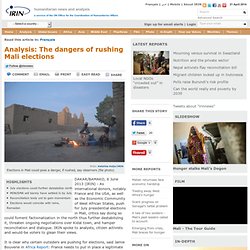
IRIN spoke to analysts, citizen activists and would-be voters to glean their views. “Conducting elections is the only realistic way,” said Paul Melly, associate fellow at think tank Chatham House. “If there were no restoration of democratic structures, the country would not get international aid and would struggle to cooperate with others countries.” Première phase des sondages d’opinion sur l’élection présidentielle du 28 juillet 2013 : Trois candidats déterminants: IBK (38,90%); Soumaïla Cissé (13.52%) ; Dramane Dembélé (9,54%) La grande majorité (83%) de la population opte pour la libération de Kid. Mali's Premature Elections Threaten Stability and Future Legitimacy. Mali’s upcoming presidential election, now due on 28 July, will be a watershed moment for the crisis-torn country. The goal of the election – to return the country to constitutional order and restore the political process – is something that Mali desperately needs.
But the election holds no guarantee of attaining this goal. Indeed, there are compelling reasons to think that a July election will do more harm than good. Security concerns The first reason is that northern Mali remains insecure, vulnerable to attacks by armed groups, and partly outside of government control. Wp-content/uploads/2013/05/Une-election-dictée..pdf.